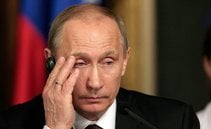The European Union is indirectly supporting the Russian war effort against Ukraine.

As Ukraine tries to solidify its recent gains in the Russian Kursk region, reports are coming out showing the current extent of European gas imports from Russia. The matter gained significance as the Ukrainian army conquered a gas measuring station near the village of Sudzha, on the Russo-Ukraine border.
The conquest of Sudzha is unlikely to disrupt gas flows to Europe as the pipelines cross Ukrainian territory too and Kyiv could block them at any time.
The Wall Street Journal claimed on Thursday that Ukraine was behind the Nord Stream sabotage in September 2022. The Nord Stream pipelines connected Russia and Germany, the main buyer of Russian gas in Europe, directly.
Nevertheless, European countries continue buying Russian gas and oil at the rate of billions of euros every month. According to Euractiv, EU countries paid €200 billion in Russian fossil fuels since the Russian invasion of Ukraine in February 2022. That figure is smaller than the €185 billion in direct support to Kyiv.
Oil and gas revenues are the main driver of the Russian economy and a crucial lifeline to their illegal invasion.
“The political reality is that it is extremely difficult for European countries to fully diversify their energy supplies when many are already struggling with high inflation and a cost-of-living crisis,” Armida van Rijd, a senior research fellow at the Royal Institute of International Affairs in London, told the Associated Press.
Slow detachment
Despite the massive figures for Russian fossil fuel purchases, the European Union made significant steps forward to reduce its energy dependence on the Kremlin.
EU countries paid €5.4 billion in March 2022 on Russian gas, down to €1.5 billion in March 2024. Russia supplies 3% of European diesel and 5% of its oil today, down from 50% and 25% in 2021 respectively.
Norway and the United States replaced Russia as the EU’s top energy providers. Imports from the US caused a surge in Liquid Natural Gas (LNG) purchases.
But while some countries, like Italy, Romania, and Lithuania have pretty much banned Russian direct imports, they still receive Russian gas through third-party countries. Specifically, many EU countries now import gas from Turkey and Azerbaijan, which buy it from Russia.
“Russian gas is being laundered through Azerbaijan and Turkey to meet continued high European demands,” van Rijd said. In other cases, like Austria, gas imports from Russia increased after the war.
It’s unclear whether the European Union will ever fully stop its Russian fossil fuel imports. Russia has the world’s largest proven gas reserves and the 8th largest oil reserves. And while the EU is rapidly progressing towards a green transition, it will still take several years to complete.
For the moment, therefore, the European Union will continue indirectly supporting the Russian war effort.





